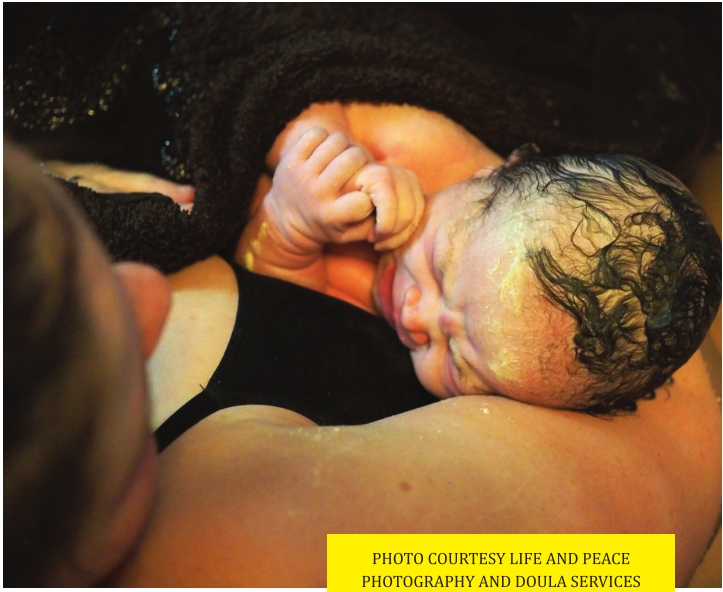
Birth is normally a happy time of ecstatic anticipation for many women and their families, but this can be a scary prospect in the age of a global pandemic. Though we in central Illinois have been fortunate with social distancing and less population density to escape the full ravages of COVID-19 (i.e., hospitals being overwhelmed), many birthing mothers and families in central Illinois are considering their options, including home birth.
“[Home birth] midwives are looded with new inquiries. I think that’s a testament to the generalized fear and anxiety that we’re all going through right now,” said Bethany Payne of Life and Peace Photography and Doula Services of Springfield. Payne works in both hospital and home settings, providing education, comfort, assistance and assurance to birthing mothers and their families.
Home birth in Illinois has a complicated history. Though surrounding states recognize a variety of professional birth-related licenses, Illinois only recognizes Certified Nurse Midwives (CNMs), who may practice only with an agreement with a collaborating physician until reaching 4,000 hours of service.
For many years, legal home birth operated solely in the Chicago area, resulting in a lourishing underground midwifery movement in downstate Illinois. These so-called black market home birth midwives were often educated, experienced and licensed, but not able to work openly under Illinois law. As such, they were not able to carry oxygen and life-saving medications, and often could not accompany a birthing mother who transferred to a hospital without facing legal repercussions. Birth activist groups like the Illinois Council of Certified Professional Midwives and Illinois Friends of Midwives have encouraged lawmakers to make home birth fully legal and accessible since the early 1970s to encourage maximum safety.
Currently, there are three CNMs operating in the Springfield area, under a collaborative agreement with a Bloomington physician. Once the stay-athome order was issued by Governor JB Pritzker, Jenni Collins of Home Sweet Home Birth, based in Hopedale, said, “I probably got two or three calls per day for two weeks straight in March. I think people might have panicked.” Locally, CNMs have seen an uptick in clients, but are not as completely booked as they are in more metropolitan areas like Chicago or New York City that have been hit much harder with COVID-19.
Despite fears of COVID-19, “The hospital is the safest place for mothers and infants. We have taken many precautions to ensure the safety of our patients, and the risk of contracting the virus is extremely low in the hospital setting,” according to Dr. David Graham, senior vice president and chief quality and innovation officer of Memorial Health System, and also a clinical associate professor in the Department of Family and Community Medicine with Southern Illinois University School of Medicine.
Locally, HSHS St. John’s Hospital and Memorial Health System have worked together to take a proactive approach to making their maternity suites as safe as possible. The two hospitals share protocols, such as wearing masks and modifying the visitor policy. Only one visitor is allowed, usually the birthing mother’s partner, while a doula is considered part of the care team. Both hospitals are also taking the temperature of anyone who enters. No positive cases have been recorded for any professional staff or visitors to either hospital’s maternity loors.
Collins is also taking precautions to prevent the spread of COVID-19. “I have had a lot of conversations with my clients about keeping themselves safe,” she stated. “If they test positive, they are considered high risk, and are no longer eligible for a home birth. I encourage my clients to limit contact, to socially distance if they do need to go out, and to shelter-in-place as much as possible.” Collins has also reduced the amount of equipment she brings into the home (leaving “just in case” equipment in her vehicle unless needed), and has adapted to virtual appointments and spacing out appointments that must be done in person. For now, her birthing assistants who also work in hospitals are on hiatus.
Through the lood of new inquiries, Collins was able to have a lot of conversations about the process and relationships that form in the home-birth setting. “There’s been a lot of positive coming out of this. I think it’s educated a lot of people on what I do and opened minds that I am a real provider, licensed and certified.”
Whether a home birth or a hospital birth is the right setting for any birthing mother and her family is dependent on many factors, including cultural beliefs and finances. Collins afirmed, “For low-risk women, home birth is the safest evidenced-based option. But if a woman originally felt giving birth in a hospital was safer than giving birth at home, for them, it likely still is.”
Carey Smith of Springfield is a irm believer that mothers should give birth wherever they feel most comfortable; for her it was in her living room.
If you are considering having a home birth, CNMs operating in central Illinois include:
Jenni Collins, Home Sweet Home Birth
Laura Lawson, Her Choice Midwifery Services
Amie Carter Hernandez, Servant’s Heart Midwifery Services